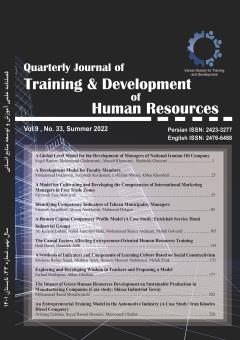Providing a World Class Model for National Iranian Oil Company Manager's Development
Subject Areas : مدل های بلوغ آموزش و توسعه در سازمان و نحوه ارزیابی آنSogol Ranvar 1 , Mohammad Ghahramani 2 , Abasalt Khorasani 3 , shahrokh ghasemi 4
1 -
2 - university professor
3 - دانشگاه شهید بهشتی
4 - head of human resources planning of the national iranian oil company
Keywords: National Iranian Oil Company , World class Managers, Training and Development of Managers, ,
Abstract :
Given (considering) the importance of human resource development, especially the development of managers as the key to the development of the country, the present study aims to provide a model for the development of managers of the National Iranian Oil Company. In the research, the mixed method has been used. In the qualitative section, using Delphi method and purposeful sampling, a semi-structured interview was conducted with 15 senior managers of national Iranian oil company in order make a questionnaire, which was thematically analyzed and coded in MAXQDA software. In the quantitative section after collecting information about 156 questionnaires from the spatial territory of all training and development units in the national Iranian Oil Company, to confirm and test the conceptional model, confirmatory factor analysis of the SPSS and LISREL software has been used. The results showed that among the dimensions of development of world-class managers, the individual dimension has the highest correlation with the latest variable and we do not see a significant difference with the desire level. After that, the group dimension is less different from the desired level, but in the organizational dimension with a global level, we see a significant difference. Given (considering) the importance of human resource development, especially the development of managers as the key to the development of the country, the present study aims to provide a model for the development of managers of the National Iranian Oil Company
ابراهيمي بلاني، مهدي؛ شهباز مرادي، سعيد. (1391). بررسي تطبيقي ابزارهاي توسعه منابع انساني در شركت ملي نفت ايران و شركتهاي پيشرو. ماهنامه اكتشاف و توليد. شماره 92.
باقري زاده، سيدمحمد؛ محبي، محمدعلي؛ حجارسنگي، اكبر. (1384). طرح پرورش و توسعه مديران اجرايي شركت ايران خودرو براي حضور در كلاس جهاني و مديرساز. شماره 16. 59-77
حسين نژاد، حميد. (1394). مديريت سرمايه انساني در صنعت نفت. ماهنامه علمي ترويجي اكتشاف و توليد نفت و گاز. شماره 121
خيرانديش، مهدي؛ زارع، محمدامين؛ مختاري، مهديه. (1397). الگوي زيرساختي بين المللي شدن شركت ملي نفت ايران: مطالعه اكتشافي و تطبيقي جهت ارائه مسير تحول. مجله علمي پژوهشي فرايند مديريت و توسعه. شماره 104. 65-89
سنجقي، محمد ابراهيم. (1380). مولفه هاي كليدي توسعه مديريت. فصلنامه علمي پژوهشي دانش مديريت. شماره 52. 3-26
سيدجوادين، سيدرضا؛ شريفي، سيدمهدي؛ رايج، حمزه. (1388). نقش توسعه منابع انساني در دستيابي به چشم انداز 1404 صنعت نفت. مديريت و منابع انساني در صنعت نفت. شماره 8. 77-100
عابدي، حسين. (1389). رساله دكتري. الگوي بازاريابي جهان تراز در ايران.
عسگري، عباس. (1384). بررسي تاثير دوره هاي آموزشي طرح رشد و ارتقا مديران در وزارت نيرو.
فارسيجاني، حسن؛ فلاح حسيني، علي. (1391). شناسايي و اولويت بندي عوامل موثر دستيابي مديريت زنجيره تامين به كلاس جهاني و ارائه راهكارهاي مناسب. چشم انداز مديريت صنعتي. شماره 24و25
فرهي بوزنجاني، برزو. (1386). معرفي اجمالي فرايندها و زمينه هاي يادگيري مديريتي و روشهاي توسعه مديران. مصباح. شماره 69. 73-86
كريمي، مجتبي. (1392). استراتژي توسعه فناوري در حوزه بالادستي نفت و گاز عربستان. ماهنامه علمي ترويجي اكتشاف و توليد نفت و گاز. شماره 107
مهدوي، محمد؛ مهدوي، مجتبي. (1386). برنامه ريزي تحول و هدايت استراتژيك فرايندهاي تحقيق و توسعه سازمان در گذار به تراز جهاني. ششمين همايش مراكز تحقيق و توسعه صنايع و معادن.
مهديزاده، محمدرضا. (1388). فعاليت برون مرزي و جهاني شدن شركتهاي ملي نفتي: بررسي موردي تجربه دو شركت نفتي آرامكو و پتروناس. مديريت و منابع انساني در صنعت نفت. شماره 5. 107-160
نظرزاده زارع، محسن؛ پوركريمي، جواد؛ ابيلي، خدايار؛ ذاكر صالحي، غلامرضا. (1393). دانشگاه تراز جهاني به عنوان بخشي از پارادايم جديد آموزش عالي. ماهنامه علمي ترويجي رهيافت. شماره 57. 75-88
http:// Beliefinstitute.com
Kahlon, Kiren (2019). The importance of new manager training in the modern workplace.
Linn,L.Robert, L.Eva. (1995). What do international assessments imply for world class standards?educational evaluation and policy analysis, vol17,no4
O'Donnell, Riia (2017). To face a changing business world, managers need better training.
Roffey Park (2019). Management training courses: do new managers need them, and why?
www.be.edu/cihe
www.wcm.society.com


